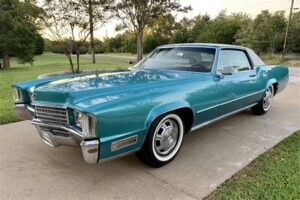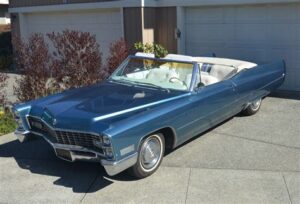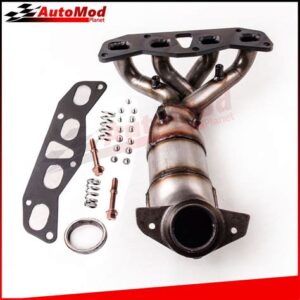If you’re a Ford F-150 owner, you know the importance of keeping your vehicle in peak condition, and a critical component of that is the catalytic converter. The Ford F-150 catalytic converter plays a vital role in reducing harmful emissions while ensuring your truck runs efficiently. However, like any other part, it can wear out or become faulty, leading to decreased performance and increased emissions. In this article, we’ll explore the significance of the Ford F-150 catalytic converter, how to identify issues, and provide a step-by-step guide for replacement. Additionally, we’ll discuss common problems and their solutions, along with the benefits of upgrading your catalytic converter for enhanced performance. Let’s delve into understanding this essential component to keep your F-150 running smoothly and environmentally friendly.
Understanding The Importance Of Ford F 150 Catalytic Converters
The ford f 150 catalytic converter plays a crucial role in the vehicle’s emission control system. By converting harmful gases produced during combustion into less harmful emissions, these components are essential for meeting environmental regulations and maintaining air quality. They help facilitate the transformation of carbon monoxide, nitrogen oxides, and hydrocarbons into harmless by-products such as carbon dioxide and water vapor.
Moreover, a functioning catalytic converter is vital for optimizing the performance of your ford f 150. A blocked or malfunctioning converter can lead to reduced engine efficiency, decreased fuel economy, and increased emissions. This not only affects the vehicle’s performance but can also result in costly repairs if not addressed promptly.
One of the significant aspects of catalytic converters in ford f 150s is their contribution to the overall longevity of the engine. By ensuring that harmful substances are processed correctly, they reduce the risk of engine damage caused by excessive harmful emissions. Maintaining or upgrading the catalytic converter can thus enhance the lifespan of your vehicle, ultimately saving you money in the long run.
The importance of the ford f 150 catalytic converter cannot be overstated. It not only plays a key role in environmental protection but also has a direct influence on vehicle performance and longevity.
How To Identify A Faulty Ford F 150 Catalytic Converter
Identifying a faulty ford f 150 catalytic converter is crucial for maintaining your vehicle’s performance and emission standards. Here are some key indicators to look out for:
| Symptoms | Description |
|---|---|
| Check Engine Light | If the check engine light is illuminated, it could indicate that the catalytic converter is malfunctioning. |
| Decreased Engine Performance | Noticeable loss of power when accelerating may suggest a blockage or failure within the converter. |
| Unusual Exhaust Smell | A strong smell of sulfur or rotten eggs can indicate that the catalytic converter is not processing exhaust fumes properly. |
| Engine Misfire | Frequent engine misfires can sometimes be linked to a problem with the catalytic converter affecting exhaust flow. |
| Overheating | If the catalytic converter is clogged, it can cause the engine to overheat due to excessive back pressure. |
To further diagnose the issue, you can perform a simple exhaust test. Place your hand near the tailpipe while the engine is running. If you feel a strong exhaust flow and hear a loud sound, the catalytic converter is likely working properly. Conversely, if the exhaust is weak or there is a significant delay in flow, it may indicate that the ford f 150 catalytic converter is faulty.
Regular maintenance, including inspections and timely replacements, will help keep your ford f 150 running smoothly and efficiently. If you suspect that your catalytic converter is defective, it is advisable to consult with a professional mechanic for a thorough diagnosis and solution.
Steps To Replace Your Ford F 150 Catalytic Converter Effectively
Replacing the ford f 150 catalytic converter is a critical task that can enhance performance and compliance with emissions regulations. Here are the steps you should follow to ensure an effective replacement:
This step-by-step guide should help you achieve a successful replacement of your Ford F 150 catalytic converter. Make sure to consult your vehicle’s service manual for any specific instructions or torque specifications.
Common Issues With Ford F 150 Catalytic Converters And Solutions
The Ford F 150, like any vehicle, can experience a range of issues with its catalytic converter. Understanding these common problems can help you address them promptly and maintain your vehicle’s performance.
- P0420 Error Code: This code typically indicates a catalytic converter efficiency problem. The solution may involve replacing the entire catalytic converter or fixing exhaust leaks that can cause this code to trigger.
- Overheating: A clogged catalytic converter can lead to excessive heat buildup, damaging other engine components. Regularly inspecting for restrictions and replacing a failing converter can solve this issue.
- Excessive Emissions: If your Ford F 150 seems to be producing more emissions than normal, the catalytic converter might not be functioning properly. A diagnostic check can confirm if the converter needs replacement.
- Decrease in Engine Performance: A failing catalytic converter can hinder your engine’s performance, leading to sluggish acceleration. Consider performing a thorough exhaust system check or replacing the catalytic converter if this issue arises.
- Strong Sulfur Smell: A malfunctioning catalytic converter may emit rotten egg odors. This usually indicates that it’s not converting exhaust gases properly. If you smell sulfur, it may be time to replace the converter.
- Frequent Check Engine Light: If the check engine light often illuminates, it might be signaling problems with the catalytic converter. Utilize an OBD-II scanner to pinpoint the problem and seek appropriate solutions.
By identifying and addressing these common issues, you can ensure that your Ford F 150 remains in optimal condition and complies with emission standards.
Benefits Of Upgrading Your Ford F 150 Catalytic Converter
Upgrading the catalytic converter in your ford f 150 can provide several benefits that enhance both the performance and efficiency of your vehicle. Here are some key advantages to consider:
Upgrading your ford f 150 catalytic converter not only helps in adhering to environmental laws, but it can also significantly enhance your vehicle’s power, efficiency, and longevity. It’s an investment worth considering for any serious truck enthusiast.
Frequently Asked Questions
What is a Cadillac converter and why is it important for the Ford F-150?
A Cadillac converter, commonly known as a catalytic converter, is an essential component of the exhaust system in the Ford F-150. It helps convert harmful pollutants in exhaust gases into less harmful emissions, thereby reducing environmental impact.
How can I tell if my Ford F-150’s catalytic converter is failing?
Signs of a failing catalytic converter in a Ford F-150 include decreased engine performance, poor fuel economy, a check engine light, and unusual noises coming from the exhaust system.
What are the benefits of upgrading to a high-performance catalytic converter for my Ford F-150?
Upgrading to a high-performance catalytic converter can enhance your Ford F-150’s engine output, improve fuel efficiency, and provide better exhaust flow, resulting in an overall boost in performance.
Is it legal to remove the catalytic converter from my Ford F-150?
No, it is illegal to remove or bypass the catalytic converter from your Ford F-150 in many regions due to emissions regulations. Doing so can lead to fines and increased pollution.
What is the typical lifespan of a catalytic converter in a Ford F-150?
The typical lifespan of a catalytic converter in a Ford F-150 can range from 70,000 to 100,000 miles, depending on driving conditions and maintenance habits.
How much does it cost to replace a catalytic converter on a Ford F-150?
The cost to replace a catalytic converter on a Ford F-150 can vary widely, typically ranging from $500 to $3,000 depending on the quality of the part and labor costs.
Can I clean a clogged catalytic converter in my Ford F-150, or do I need to replace it?
Cleaning a clogged catalytic converter is sometimes possible with chemical cleaners, but in many cases, replacement is necessary if it is severely clogged or damaged.





